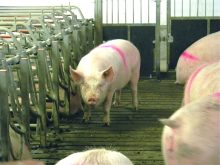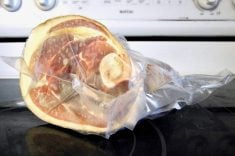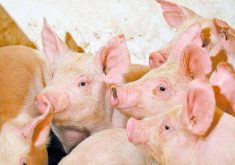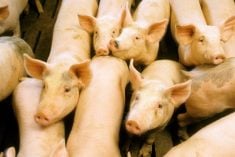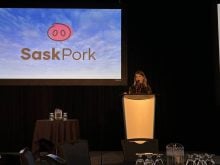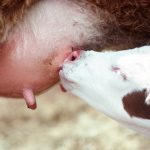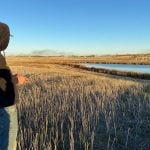The closure of another Ontario-accessible hog processing plant is raising concerns in the province’s pig sector.
Olymel, the protein arm of Sollio Co-operative, on April 14 announced the Vallee-Jonction, Que., hog slaughter, cutting and deboning facility will wind down and permanently close on Dec. 22.
Why it matters: Ontario pork producers who ship to Quebec for processing may now have to find an alternative.
Read Also

Jennifer Hayes appointed for second term as the Chairperson of the Canadian Dairy Commission
Jennifer Hayes has been re-appointed as Chairperson of the Canadian Dairy Commission by Heath MacDonald, Minister of Agriculture and Agri-Food.
The decision affects 994 employees across two daily shifts, including 911 unionized workers and 83 managers, Olymel said. Of the 911, 122 are temporary foreign workers.
READ MORE: Olymel to idle multiple Prairie hog barns
The decision follows a reduction of about 1.5 million hogs in Olymel’s total annual slaughter over the past 12 months. By operating only three slaughter plants in Quebec, Olymel said it will be better positioned to reach a reduced weekly slaughter capacity of 81,000 hogs, down from 140,000.
“It’s disappointing, and the knock-on effects in Quebec will surely have an impact here in Ontario,” said Ontario Pork chair John de Bruyn.
The Quebec meat packer’s decision to close one of its plants creates an additional challenge for producers trying to find processing for Quebec-bound hogs, said de Bruyn, but it’s not insurmountable.
“The last couple of years, a lot of our hogs going to processing in Quebec have slowly shifted in the other direction to the U.S. or maybe even to Manitoba.”
De Bruyn said there are risks involved when shipping livestock across international borders, including an impact on Canada-U.S. relations.
“Short term, I think there’s a risk there. Longer term, we hope to build a more resilient industry here in Ontario,” said de Bruyn. “We’re missing some opportunities in not processing those hogs in Ontario, and that’s one of our issues.”
Canada has added almost one per cent to U.S. domestic hog supplies in recent years, primarily because China delisted Canadian processing facilities.
Ontario Pork wants to increase processing capacity in Ontario and has had considerable dialogue at the provincial level and with industry partners, said de Bruyn.
“There are positive signs but building or expanding a processing plant is a long-term process, and it takes years, not months.”
Despite challenges, de Bruyn said Ontario has several advantages for raising hogs, including land, water, transportation infrastructure and people.
“Currently, our narrow door is probably processing capacity, and there’s no one solution that’s going to make it better for Ontario producers,” he said.
“But I’m confident there are plans being developed right now, and with a bit of government support, we’re going to see a better industry come out at the other end.”
There is finger-pointing about who or what is responsible for closure of the Vallee-Jonction facility and the impact on employees and the community.
“The community is going to have some soul-searching to do with people looking for new employment,” said de Bruyn. “We need to keep finding good people to work on our farms and good people to work in our processing plants. And together, we’ve got a great opportunity to bring GDP to our country.”
Current Vallee-Jonction employees will be offered a voluntary relocation option to another Olymel plant, the company said. It is also working with provincial and federal authorities to allow the 122 foreign workers to apply for similar relocation.
Olymel said it will meet producer demand and process remaining hogs from the Beauce region and elsewhere.
The plant’s closure will begin in mid-September by halting the evening shift, affecting 443 workers.
Depending on supply and labour availability, the day shift could continue until Dec. 22, when the site ceases operations.
– With files from Dave Bedard, Glacier FarmMedia




